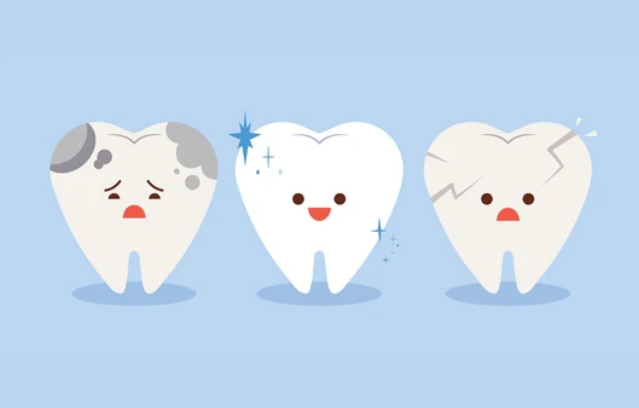
A smile, healthy teeth, and healthy gums are all benefits of good oral health. On the other hand, having poor oral hygiene can increase your risk of developing tooth decay, often known as a cavity or a rotten tooth.
Plaque, a sticky, white coating that develops over the teeth, is what causes decay. Plaque is made up of bacteria, and when these bacteria combine with food sugar, they produce an acid that corrodes teeth. It’s crucial to understand the reasons and symptoms of a rotten tooth because if left untreated, a badly rotten tooth might become loose and fall out.
Signs of Rotten tooth
A tooth that is “rotten” or “caused by tooth decay” has surface damage that will not hear
l. Regular dental clinic appointments are crucial since some cavities might go unnoticed without showing any symptoms. Early cavity detection and treatment by a dentist help prevent additional rotten teeth.
The deeper layers of the rotten tooth might eventually be harmed by an unattended cavity as it grows larger. Other indications of a decaying tooth in addition to a hole include:
- Toothache sensitivity to heat or cold marks on the tooth that is brown, black, or white
- Foul breath, horrible mouth taste, and swelling
- Infants, toddlers, and preschoolers can also experience a decaying tooth, making it not just an adult issue. Children’s tooth decay symptoms typically resemble.
Causes of Rotten Tooth
There are several potential explanations for rotten teeth rather than just one. Understanding the causes of tooth decay might help you keep your teeth healthy in the future.
Inadequate dental care
To maintain your teeth strong and healthy and to remove plaque, you must brush and floss frequently. You should floss every day and brush your teeth at least twice a day. Additionally, schedule expert dental cleanings twice a year at the dentist.
Bad diet
Because these foods stick to the teeth, eating a diet high in sugar and carbs can also hasten tooth decay.
Additionally, sugar feeds bacteria, and the more bacteria you have in your mouth, the more acid there is.
Mouth ache
You could have more plaque and acid in your mouth, which would increase your risk of tooth decay or rot if your salivary glands don’t create enough saliva to assist wash away plaque and bacteria in your mouth.
Dental fissures
Deep dental fissures can also lead to tooth decay. These groves can make it more difficult to brush efficiently, and if plaque builds up in them, it can erode the surface of your tooth. Plaque accumulation on healthy teeth may be avoided by applying a dental sealant.
How can an infant’s teeth get affected by tooth decay?
Early childhood caries is another name for tooth decay in young children’s primary (baby) teeth. Another word for a cavity is caries. It occurs when a child’s teeth are exposed to sweet foods and beverages often and for extended periods of time. Fruit juices, soda, and other sugary beverages are among these.
Parents are frequently shocked to discover that tooth rot can start as soon as a baby’s first set of teeth erupts, typically by the age of six months. Baby teeth decay can hurt, and the infection may get worse. Baby teeth might be lost if decay is not corrected.
The entire health of a child may be impacted by tooth decay as well.
How to avoid Rotten teeth through some Healthy habits at home?
CLEAN THE TEETH OF YOUR CHILD AT HOME
- After each feeding and before putting the baby to bed, wipe his or her gums with a fresh, damp gauze pad or washcloth. This removes pieces of food that can hurt teeth that are starting to come in. Additionally, it aids in the child’s acclimatization to oral hygiene.
- Starting as soon as the first tooth erupts, wash your infant’s teeth twice daily (morning and night). Use a kid-sized toothbrush with soft bristles and fluoride toothpaste. Use no more fluoride toothpaste than the size of a grain of rice till the child is three years old. Use no more fluoride toothpaste than the size of a pea on youngsters aged three to six.
PACIFIERS, BOTTLES, AND FEEDING
- Before going to bed, infants should finish their naptime or bedtime bottle.
- You shouldn’t permit your child to breastfeed continuously or doze off while doing so after his first tooth erupts.
- Infants shouldn’t be put to sleep or allowed to doze off while holding a bottle filled with milk, formula, fruit juice, or any other sugary liquid. Even watered-down drinks can damage teeth.
- Avoid dipping your child’s pacifier in honey or sugar if they use one. Additionally, avoid taking a bite of it before offering it to the youngster. Bacteria in your mouth that cause decay can be transmitted to your child.
- The use of a bottle as a pacifier is not advised. Drinking sugary beverages frequently can lead to tooth decay.
SIPPY (“TRAINING”) CUPS
- Try to persuade your child to drink from a cup by her first birthday to reduce the chance of dental decay.
- Don’t let your infant drink sugary liquids nonstop (including juice drinks). Only serve these liquids during meals. While the youngster is in the car or stroller, keep the cup out of their reach. Offer water in the cup to your child if they get thirsty in between snacks or meals.
- Training cups ought to be used for a brief period of time only. The training cup should be put away once your youngster has mastered the art of sipping.
Strong Teeth Are Built with A Healthy Diet
- Eat fewer snacks in between meals.
- Avoid rewarding your child with sweet foods and beverages.
Treatment for Rotten teeth in the early stages of decay
Your dentist might administer a fluoride treatment to strengthen or remineralize the tooth in the early stages of tooth rot (small cavities) to prevent further decay. However, this approach is only beneficial for minor cavities; it is ineffective if other rotting symptoms, including brown or white spots on the tooth and poor breath, appear.
Treatment for teeth that are severely decayed
Your dentist can remove any rotten areas of the tooth and perform a dental filling or dental crown to cover any holes in the tooth if fluoride treatment is not an option. Your dentist may treat a cavity with a composite resin that matches your teeth or an amalgam filling made of mercury, silver, or another metal.
Treatment for teeth in the most advanced stages of decay
If the decay has reached the middle of the tooth and there is swelling or infection, you might need a root canal. After removing the infected nerve and pulp, your dentist will fill and seal the opening.
Your dentist may take the rotten tooth and replace it with a denture, bridge, or an implant if a tooth cannot be salvaged because of extensive decay.
You might believe a root canal is not necessary because your child’s decayed baby tooth cannot be treated with a dental filling. After all, it is not a permanent tooth. But even though a rotten tooth will eventually fall out on its own, the dentist for your child can nonetheless advise a root canal.
It’s crucial to visit your Family Dental clinic or it is convenient today to schedule an online consultation and pay attention to any cavities that may be present because rotten teeth can range in severity. Early detection enables treatment and the potential avoidance of rotten tooth consequences including infections and tooth loss.

